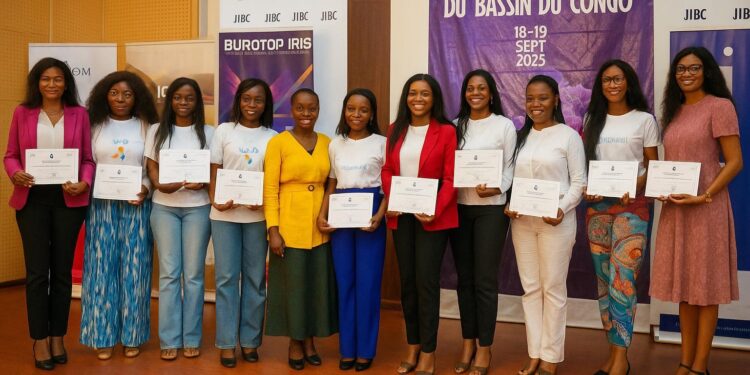Women-Led Tech Ventures Gain Momentum in Brazzaville
During the Congo Basin Innovation Days, the Burotop Iris Foundation, chaired by Diana Attye, unveiled ten projects steered by young women graduates from its three-month incubation cycle at the Brazzaville Fablab.
The showcase drew investors, development banks and public officials who see gender-inclusive entrepreneurship as a lever for economic diversification in a nation still reliant on hydrocarbons.
Organisers stressed that the initiative aligns with the government’s digital transformation agenda and builds on Congo’s commitment to reducing gender gaps in access to finance.
Inside the “Femmes et entrepreneuriats numériques” Programme
Launched in 2021, the programme couples technical upskilling with business modelling workshops, mentoring sessions and seed-capital matchmaking, all fully sponsored by the Burotop Iris Foundation (local press reports).
Participants attend modules on cloud tools, high-tech prototyping and market validation, culminating in a demo day where each team pitches a minimum viable product to potential backers.
Graduates receive certification recognised by local chambers of commerce, an asset that eases registration procedures and enhances credibility with banks and strategic suppliers.
Strategic Sectors Targeted by the Laureates
Four projects address agro-food value chains, from nutrient-dense snacks to supply-chain tracking apps that cut post-harvest losses, reflecting the government’s priority to reduce food imports.
Two ventures in communication and media exploit growing smartphone penetration to deliver curated content and brand services for SMEs seeking wider reach.
Transport solutions, an event-tech tool and a cloud-based innovation platform round out the cohort, illustrating the breadth of opportunities across Congo’s emerging digital economy.
Training, Mentorship and Early Financing
To convert ideas into viable firms, the foundation supplied laptops and provided access to 3D printers, data-analytics software and co-working space valued at over XAF 15 million, according to organisers.
Mentors, including bankers and tax advisers, coached participants on credit applications and compliance, addressing common pain points such as collateral requirements and fiscal complexity.
Several local banks signalled readiness to extend micro-loans once projects demonstrate initial revenue, an encouraging shift from the historical underfinancing of women-owned enterprises.
Individual Stories: Healthtech Magazine and Botanical Cosmetics
Dominique Nguiegna, publisher of a digital health and wellness magazine, intends to demystify medical information for wider populations and monetise through subscription and targeted advertising.
“Congo can finance women-owned companies; you just need a solid niche,” she remarked after receiving her certificate, noting that experts trained her cohort in digital economy fundamentals and company formation.
Process-engineer Thomono Divine focuses on botanical cosmetics, transforming medicinal plants into antiseptic soaps and therapeutic fragrances to meet rising demand for eco-friendly personal care products.
Regulatory and Market Backdrop for Female Founders
Congo’s 2022 Startup Act offers corporate tax holidays and import-duty exemptions on equipment for accredited innovators, benefits the graduates are now eligible to apply for.
The Central African Banking Commission also eased microcredit rules for women-led SMEs, allowing reduced collateral ratios, a policy welcomed by philanthropies and multilateral lenders.
Despite progress, entrepreneurs still cite gaps in sector-specific regulations and digital-skills shortages; organisers argue that public-private incubators can narrow these gaps faster than legislation alone.
Outlook: From Local Incubator to Regional Scale
Foundation officials plan to showcase the ten ventures at an upcoming Paris roadshow to attract diaspora capital and strategic partnerships, mirroring success stories from Kenya and Senegal.
Analysts note that Congo’s consumer market remains modest, yet regional trade pacts under ECCAS give scalable startups a 200-million-person horizon if they secure logistics and distribution alliances.
By linking capacity building, seed funding and policy incentives, the Burotop Iris model offers a blueprint investors can replicate across Central Africa to foster inclusive, tech-enabled growth.












































